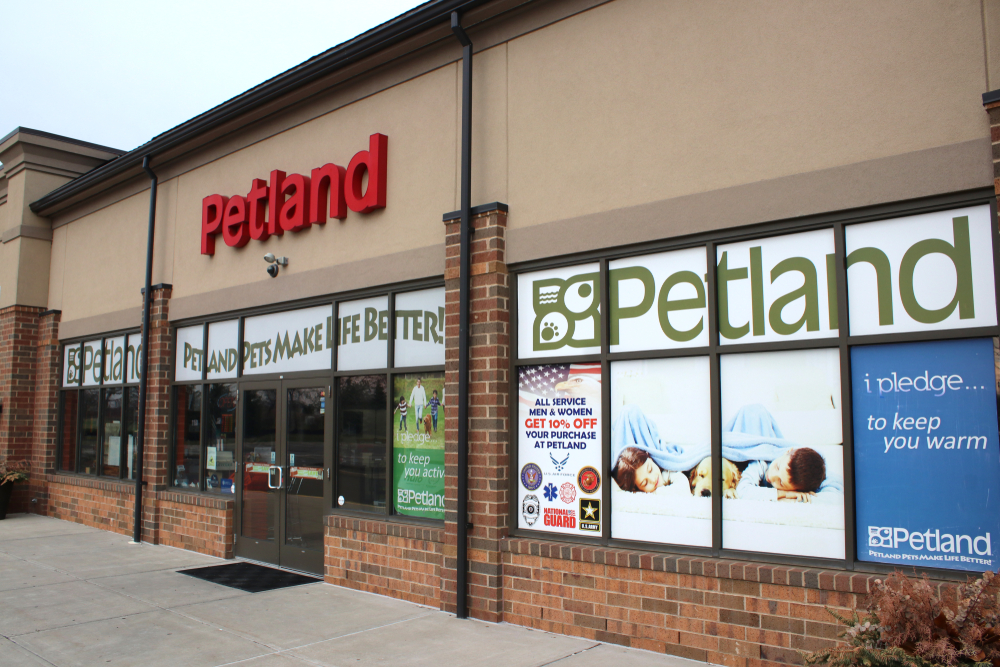From convenience to affordability and flexibility, pet stores can make pet ownership a light burden.
For a pet parent, having a facility that can take care of your baby is everything.
Most pet stores are located near residential areas and offer in-store services such as health checkups and grooming.
If you are a casual buyer, you can drop by the store any time and choose your puppy.
Perhaps the most important factor is that pet stores are affordable compared to reputable breeders.
Petland is one such store. With more than 200 stores worldwide, the company is a household name in the United States and the rest of the world.
It sells hundreds of thousands of puppies every year across the planet.
However, like every other business, deadstock is inevitable. No matter how famous the company is, it cannot dispense all its products to buyers.
So, what really happens when a puppy is not picked out at the market? We’ll find out shortly but first things first…
What is Petland?

Petland is a US-based privately held corporation with headquarters in Chillicothe, Ohio.
As the name goes, the company sells pets. It mainly deals with puppies, kittens, small animals, fish, and birds.
It was started in 1967 by Edward R. Kunzelman who happens to be the current CEO.
The company initially owned stores in Ohio, Kentucky, and West Virginia.
After three years, Petland began franchising all over the world. Now, 90% of their stores are franchises.
According to Wikipedia, the company became a $50 million corporation with approximately 230 stores.
Sadly, the 2008 financial crisis affected business a little but Petland has maintained a huge chunk of its stores to date.
It sells most of its products to the United States, Canada, South Africa, Mexico, and Japan.
The Controversy Surrounding Petland
For a long time, Petland’s reputation was that of a good corporation with deep care for animals.
When you visit the website, you will instantly love what the company does. It promises to sell puppies from reputable breeders that raise them in healthy conditions.
The company even runs campaigns for adopting pets and has charities that support animal welfare.
Well, things took a bad turn when the Humane Society of the United States (HSUS) published an investigation on the company in 2008.
The investigation which took 8 months revealed shocking things about the operation of Petland stores across the United States.
HSUS visited 76 Petland stores located in Ohio, Nevada, Florida, Indiana, and Minnesota.
Additionally, investigators spoke to 35 brokers and breeders linked to Petland and checked the health certificated of about 17,000 puppies from the store.
They discovered that Petland purchases puppies from puppy mills and sells them to unsuspecting buyers.
The puppies are raised in barren, filthy cages full of urine smells. They are not well taken care of and socialized.
What’s worse is that Petland doesn’t seem to screen breeders before buying from them.
In certain cases, the company doesn’t even know the name of the breeder before making the purchase.
As if the HSUS investigation is not enough, Petland faced a class action lawsuit on their mode of doing business in 2017.
Also, the company doesn’t have a very good name on Consumer Affairs.com where there are over 500 negative reviews with many claiming the company gets their dogs from puppy mills.
What Happens To Puppies That Are Not Sold?

Pet stores hope to sell all their puppies so they can go back for more and keep the cycle going.
In reality, however, hundreds of them are not purchased. The nightmare of what happens is heartbreaking.
1. The puppy becomes a breeder dog
In the best-case scenario, animals that are not picked out go back to the breeder.
They may hang around the pet store for a while but after they have outgrown the age of selling, they are taken back.
Since the breeder had initially sold them to the pet store, they will have to buy them back.
In most cases, they give healthier younger puppies in exchange for ‘unwanted’ older puppies.
The latter will then become a breeder dog to keep the puppy mill going.
2. Given away
A pet store may also decide to give the puppy away if it is not bought on time.
First, it marks down the price hoping it will attract interested buyers. If they are unsuccessful, they will count their losses and pass the pets to interested parties. These can be friends, families, employees, etc.
Because of the losses incurred, not many dogs are given away.
3. Dropped off at the side of the road
Dogs that don’t manage to get a buyer may also be left out in the cold. Some pet stores drop them off at a nearby shelter.
However, it is not uncommon to come across those that don’t care about their welfare at all.
As long as they are past the age of selling, cannot breed, or are very sick, they will be disposed of anywhere.
4. Taken to the shelter
Pet stores occasionally give away dogs to shelters and rescue groups. This is a humane option of dealing with pups that refuse to sell.
It is certainly much better than killing them or giving them back to puppy mills.
Rescue centers can get forever homes for the lovely pets or keep them in good growing conditions.
Sadly, sometimes they put down their dogs when they become overwhelming.
5. It is left to die
In other cases, puppies that are too sick or too old to reproduce are put in isolation rooms to await their death.
Sometimes, the pet store hides the sick puppies away from the crowd until they die a natural death.
Once they do, they take the bodies back to the breeder for credit. Puppy mills have a burial site for adult dogs and puppies.
There are rules for how many animals should be buried therein. Many of them exceed the limit by a huge percentage every time.
Closing Thoughts
Petland may be the king of the puppy business but it is definitely not without controversies.
Because of its reputation of working with puppy mills, chances are they don’t treat their ‘dead stock’ very well.
But all animals deserve care and attention—whether they are sold or not.
Hopefully, Petland can learn to deal with all their unsold puppies humanely in the future.
As an Amazon Associate, we may receive a small commission from qualifying purchases but at no extra cost to you. Learn more. Amazon and the Amazon logo are trademarks of Amazon.com, Inc, or its affiliates.

